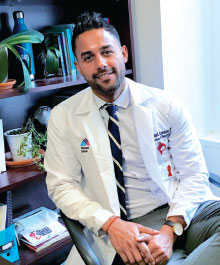Mount Sinai Offers Fellowship in Transgender Psychiatry
Abstract
The one-year fellowship seeks to meet the needs of patients who are transgender.
The Icahn School of Medicine at Mount Sinai Health System in New York City has created a one-year fellowship in transgender psychiatry in its Center for Transgender Medicine and Surgery to help meet the growing need for treatment of transgender individuals in the United States.

Hansel Arroyo, M.D., says that he finds his work with transgender patients at Mount Sinai to be among the most rewarding of his career. “I wouldn’t change what I do.” Mount Sinai is accepting applications for the fellowship.
“The fellowship was launched in 2017 because the visibility of transgender individuals is increasing, yet when they come for medical services, often providers feel they don’t know what to do,” said Hansel Arroyo, M.D., director of psychiatry and behavioral medicine at the Institute for Advanced Medicine and the Center for Transgender Medicine and Surgery and an assistant professor of psychiatry at Icahn School of Medicine at Mount Sinai.
One factor leading to the increased demand for transgender care was the May 2014 decision by Medicare to lift its exclusion on coverage for gender-affirming surgeries. “More insurance companies are covering this type of care,” he said. “However there is a big gap in physician training when it comes to meeting the needs of this population. The amount of time dedicated to training around the needs of the LGBTQ population in North America is miniscule and embarrassing at best.”
One study found that only about five hours of medical school training on average is spent covering issues related to LGBTQ health, according to an article in the September 7, 2011, JAMA, which summarizes the responses of 132 North American medical school deans. Today the problem persists: only a few U.S. medical schools offer classes, training, mentorship, and research opportunities in LGBTQ-focused health care, such as the University of California, San Francisco, and Vanderbilt University.
Along with its offerings of primary care and psychiatric support for individuals who are transgender, the Center for Transgender Medicine and Surgery offers medical approaches—hormones and a range of surgical options—for patients who wish to align their physical appearance with their gender identity, known as gender-affirming care. Since opening its doors three years ago, the center has performed more than 1,000 surgeries and served more than 2,000 transgender patients with primary care or psychiatric support.
“While many psychiatric fellows work only in a mental health setting, the transgender fellow works on an interdisciplinary team that spans surgical, primary care, psychiatric, and specialty medical,” Arroyo said.
It’s not necessary that a fellow be a member of the LGBTQ community, but only has “a heart to care for transgender and gender-expansive individuals,” Arroyo added. The fellows learn about hormone therapy and gender confirmation surgery and get an understanding of all the services offered at the center, Arroyo said. “It’s a pretty unique opportunity, and when we started this program in 2017-2018, ours was the only fellowship like this out there.”
Psychiatrists at the center are involved in presurgical meetings to assess readiness for gender confirmation surgery. They also conduct psychiatric consultations and participate in the mental health education of the surgical and primary care teams. “This is the perfect opportunity for those who want to dedicate part of their career to helping an underserved or minority population, particularly in the transgender community,” Arroyo said.
The center currently has two fellows in transgender medicine—one in psychiatry and one in surgery. The psychiatry fellowship is one year, and the next fellow will start training in July.
“I find the work I do at the center to be among the most rewarding of my career, and I wouldn’t change what I do,” Arroyo said. “I simply cannot imagine having the drive to wake up in the morning to do anything else other than what I do right now.” ■



